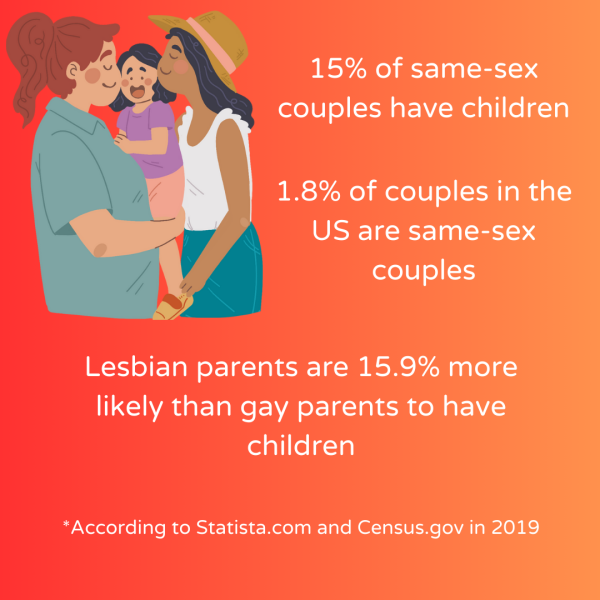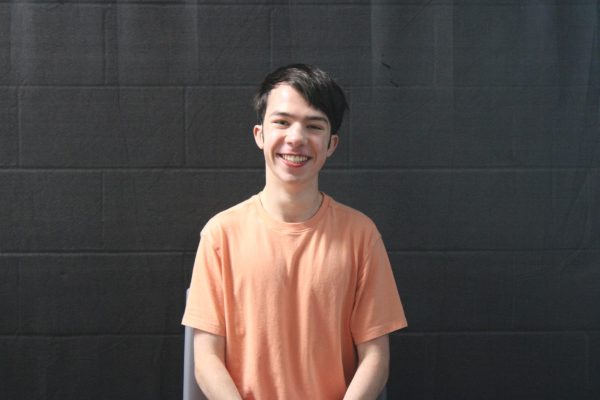For his whole life, senior Jack Zimo has pretty much only known his life with his mom and step-mom. After his mom and dad divorced when Zimo was two, his mom eventually married her long-time friend Joan when Zimo was six years old. Zimo has always seen his home life as relatively normal, and doesn’t care how others think about it.
“I’ve [lived with my mom and step-mom] ever since I was a little kid,” Zimo said. “Going back and forth [between my parents’ and my dad’s house], I just know [that routine] by heart now.”
Being a legal child of same-sex parents hasn’t always been a possibility. Marriage between gay or lesbian couples only became legally recognized in the United States in 2015 with the Obergefell v. Hodges court case, in which Jim Obergefell sued the state agency in Ohio, along with various other same-sex couples suing their states.
Their claim was that their states’ bans on same-sex marriage violated the 14th Amendment to the United States Constitution, which says that states cannot pass laws that infringe on the people’s life or liberty. The U.S. Supreme Court eventually agreed with them and officially legalized same-sex marriage. Although same-sex marriage is now legal in all 50 states, it can sometimes be seen as unusual to have gay or lesbian parents.
However, Zimo sees it as regular and conveys that normalcy when talking about it with others. He currently lives in Mount Prospect with his mother Kirsten and his step-mother Joan. In between spending time with his parents, Zimo often visits his father, Jack, whom he shares the same name with, in Chicago where he works as a fireman. His father lives there with his wife, Heather, and their children.
Even though Zimo’s family structure is unique, he doesn’t often feel the need to tell people about it since he sees it as no less normal than having straight parents.
“It doesn’t matter to me if people know or not,” Zimo said. “If you know, you know; and if you don’t, I’m not going to go out of my way and say anything.”
However, not all young people with same-sex parents have the same experience as Zimo. Many may find it uncomfortable to openly discuss their family, or may even face discrimination because of it. This can be attributed to how same-sex couples are still quite uncommon in the United States. According to Statista.com and Census.gov, only one million of the roughly 62 million couples in the U.S. are same-sex couples as of 2019. Of those, only 15% have children.
In order to create a guaranteed safe space for both queer and straight students, social studies teacher Erik Hodges created the Gender-Sexuality Alliance club (GSA) with social worker Daniel Weiler. According to a KnightMedia survey of 154 students, 2.6% have experienced bullying or harassment because of their or their parents’ sexual identity. In order to combat this, Hodges uses his club to promote more open discussion and understanding of topics related to gender and sexuality.
Specifically, Hodges holds group discussions with the club’s members about national news relating to LGBTQIA+. Hodges believes the importance of being more tolerant lies in not judging people’s character on their parents sexual identity.
“A family should be based around love and a common desire to help each other and watch your children grow,” Hodges said.
For Zimo, people will sometimes assume having same-sex parents means that he is adopted. However, even though same-sex couples are four times more likely to adopt than different-sex couples, the amount of adopted children for same-sex couples is still less than half the total amount.
Organizations like GSA work to encourage this kind of knowledge of topics like gender identity and LGBTQIA+. GSA meets every other Monday in room 133. Hodges emphasizes that they don’t make students share anything they are not comfortable with sharing, including their pronouns or sexual orientation. The group is always open to new visitors, no matter how one may identify, or if they even identify as queer at all.
“Everyone’s on a different journey [in GSA], it’s very unique,” Hodges said.
Zimo appreciates the uniqueness his own family brings to his life. He finds it difficult to imagine his life any other way, as he recalls cooking dinner with his parents, picking his dad up from the airport and going to his aunt’s house for barbecues in the summer.
“All my parents raised me to how I am now,” Zimo said. “So I turned out alright.”




































































